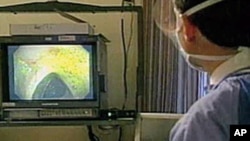A new study shows that colon cancer is more prevalent among people under the age of 50 than previously thought.
The study was published Monday in the journal Cancer, and found that one out of every seven patients with colon cancer is under 50. The younger patients also tended to have more advanced cancer than their older counterparts.
For the study, the researchers looked at 260,000 patients who were diagnosed with colon cancer between 1998 and 2011. The study found that 15 percent of the cases involved people under 50; however, younger patients lived longer with a lower chance of recurrence due to treatment.
"We were surprised that the numbers were that high," said the lead author of the study, said Samantha Hendren, an associate professor of surgery at the University of Michigan in Ann Arbor, in an interview with the Tampa Bay Times.
Hendren added that she was seeing a spike in cases among people in their 30's and 40's.
Doctors usually recommend regular screening for colon cancer after age 50, but people with a family history of the disease are urged to start the screening process as early as 40.
In an interview with CBS News, Hendren said the findings should be a “wake-up call,” but that it didn’t necessarily mean changes will be coming to the screening guidelines.
According to the American Cancer Society, colon cancer is the third leading cause of cancer-related deaths in the United States and is expected to cause more than 49,000 deaths this year.
The most common symptom of the disease is dark red blood in bowel movements.
"Small, skinnier, pencil-thin stools are often a sign of a tumor being present," Hendren told the Times, noting that weight loss is another clue that something might be amiss.
Andrew Chan, an associate professor of medicine at Harvard Medical School in Boston, said it is not known why colon cancer is showing up among younger people.
"It is unexplained," he told CBS News. "It's not simply a change in diagnoses, it's a very real increase. There may be an effect of our environment that could be contributing to the increase."
He added that like all cancers, smoking, obesity, a poor diet and a sedentary lifestyle are risk factors.





